Listing and Documentation Publications
The Nomadic Bakarwals of Jammu & Kashmir
2005
Tribal existence closely follows the patterns of nature. The nomadic Bakerwals survive on their understanding of these patterns and of late are suffering the vagaries of development which is encroaching upon their grazing grounds as well as upon the vagaries of climate change. The report portrays their way of life and the changes taking place under the changing presures of modern influences.
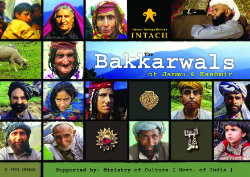
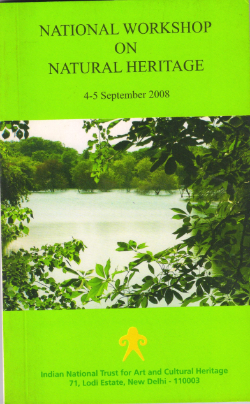
National Workshop on Natural Heritage
2008
“The book contains eleven (11) papers for the four (4) sessions, which consist of ‘Understanding Natural Heritage’, ‘Listing and documenting Natural Heritage’, ‘World Heritage Sites (Natural) in India’, ‘Policy and Legislation for Natural Heritage’. The workshop was a new thrust area for INTACH to build momentum and for a network for the conservation of natural heritage in the country.”
What is Nature Worth
2008
This booklet is an initiative for creating better understanding and awareness about valuing natural heritage in terms of ecosystem services whose monetary worth is never accounted for in the cost benefit analysis of development projects. Today, this neglect of nature’s worth is sought to be addressed in innovative accounting to counter harmful projects.
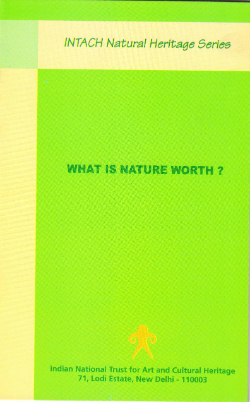
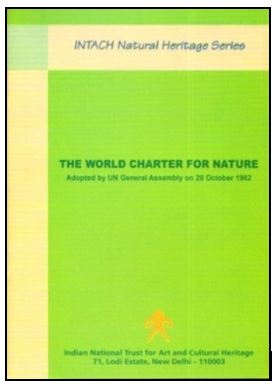
The World Charter for Nature
2008
The Charter is at par with the UN Declaration on Human Rights, which contains basic principles to be observed for achieving the conservation of nature and natural resources for the very survival of the human race. Fundamental features of Indian Culture are incorporated in the book. It lays down a moral code of behavior for human beings in their relationship with nature.
Traditional Ecological Knowledge (TEK)
2009
The booklet focuses on the importance of indigenous and traditional communities and the wealth of their ecological knowledge based on sustainable ways of co-existing with Nature and it’s bounties. This wisdom can prove very useful for the challenges being faced these days.
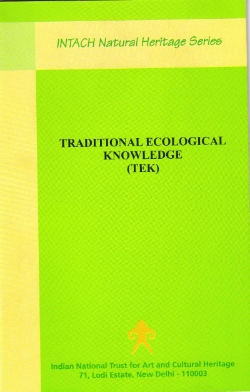
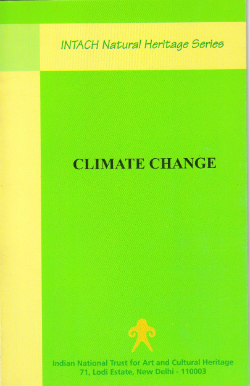
Climate Change
2009
The booklet contains a brief overview of India’s National Action Plan on Climate Change and other relevant material on the subject. It has been published to emphasize the role and responsibility of each individual and for general awareness of the global warming issue.
Narratives of the Environment of Delhi
2010
The book raises awareness of the natural past of NCT Delhi that is vanishing and thereby encouraging action for it’s conservation. The document adopted a narrative approach as against a scientific one. This is an interesting record from archival material and reminiscences of veteran Delhi citizens who have witnessed an era when the city’s natural features blended readily in its daily life and where they had not yet been isolated from nature by concretization.
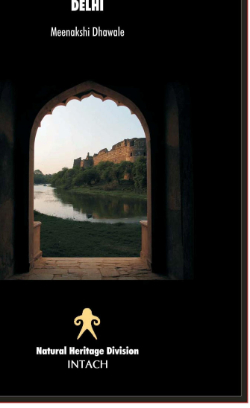
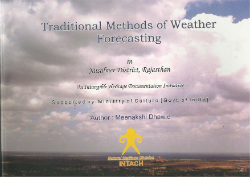
Traditional Methods of Weather Forecasting – Jaisalmer District
2011
The report contains documentation and classification of the traditional techniques of predicting arrival or failure of monsoons in the district of Jaisalmer. These traditions still have value for rural communities of the Thar desert, which are gained by observations over centuries and are a fairly reliable guide to sowing operations and the critical availability of water in an arid terrain.
A Monograph on The Sacred Woods Used in Traditional Religious Ceremonies in India
2012
The monograph is on the importance and significance (from a religious as well as ecological perspective) of sacred trees. Due to some species’ ecological value and efficacious properties, wood from particular trees continues to be used in the religious and social ceremonies of the Hindus.
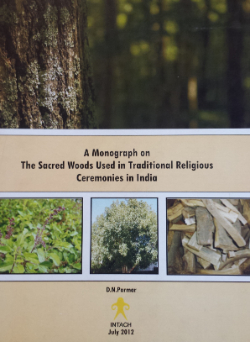
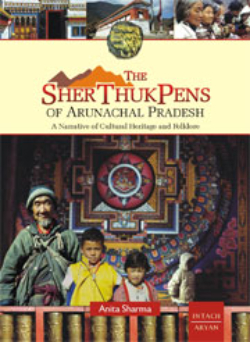
The Sherthukpens of Arunachal Pradesh
2013
Tribal existence closely follows the patterns of nature. The Sherthukpens survive on their understanding of these patterns and of late are suffering the vagaries of development which is encroaching upon their grazing grounds as well as upon the vagaries of climate change. The report portrays their way of life and the changes taking place under the changing presures of modern influences.
The Lepchas of Dzongu Region in Sikkim
2013
Tribal existence closely follows the patterns of nature. The mild mannered Lepchas survive on their understanding of these patterns and of late are suffering the vagaries of development which is encroaching upon their grazing grounds as well as upon the vagaries of climate change. The report portrays their way of life and the changes taking place under the changing presures of modern influences.
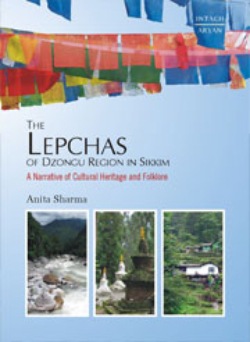
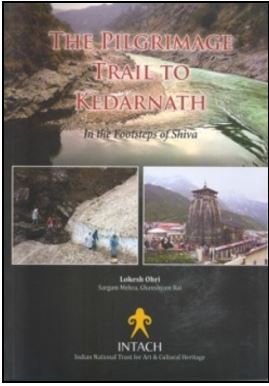
The Pilgrimage Trail to Kedarnath
2016
The report contains documentation of the ancient pilgrimage routes to the revered shrine of Kedarnath. The book guides the spiritual seeker and adventurer to venture into the Himalayas to search for Shiva, tracing the paths trodden by Sadhus and pilgrims since time immemorial. In a time when the pilgrim arrives and departs in a jiffy foregoing the contemplation afforded by the journey on foot the value of the latter is sharply adduced – the faster the velocity the less the spiritual content.
Traditional Water Structures of Rajasthan
2017
The book contains listing of the traditional water structures of 12 districts of Rajasthan. Under planning and architecture – typology of water structures dependant on rainwater and ground water are included.
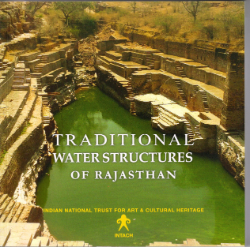
Celebrating The Spirit of Rivers – An Anthology of Select River Poems
2017
This thin booklet contains some renowned poems on rivers by eminent poets in English and Hindi.
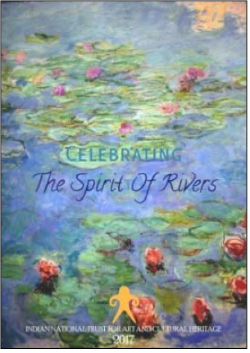
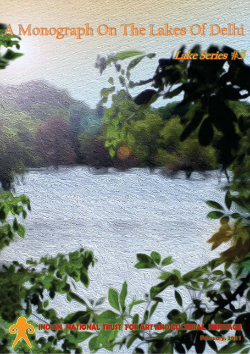
A Monograph on the Lakes of Delhi
2021
With interest rising in the conservation of water bodies in and around cities, INTACH decided to put its archival material on Delhi’s waterbodies, gathered over last 26 years in the public domain. This monograph contains details of 27 major waterbodies of Delhi
Manual on Kitchen Gardening
2021
The manual was developed as part of the training on nutition gardening. As awareness regarding health is increasing, coupled with the fact that the fresh fruits and vegetables avaialble are not only low in nutritional elements but also laced with many toxins, people are keen on growing food on their own. It is a sincere effort to help people grow different vegetables, fruits and other plants which are required in the kitchen as food material in the courtyard of house, on terrace or on a part of agriculture farm.
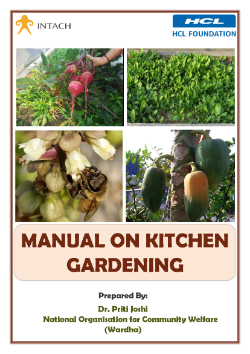
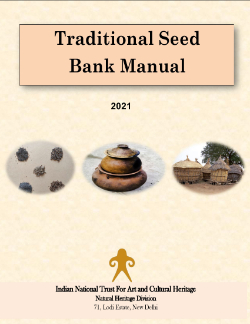
Traditional Seed Bank Manual
2021
Seeds are one of the most important natural heritage we have. If lost, the native seeds are lost forever. These are our living heritage, which means to conserve the native seeds, it not only needs to be conserved but also grown and multiplied. Over thousands of years, traditional agriculturists have selected and saved seed from plants that expressed a diversity of traits of interest to them or their communities. Agro biodiversity conservation is required to ensure food security. Seed banks are the self reliant option in crop production in the face of mounting challenges posed by climate change. The manual presents guidelines on establishment and operation of seeds bank; collection, preservation and multiplication of native seeds and creating awareness regarding native seed heritage of the region.
